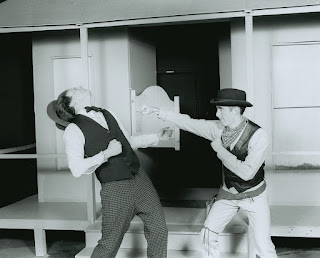Late last year, my health went on hiatus and I found that everything became a challenge. I couldn't go anywhere or do much of anything. Between the cold weather and the accelerating family arthritis, playing guitar and typing were difficult, and naturally, that interfered with my writing. Now that the effects of the steroids are diminishing and warmer weather is creeping back, my hands are regaining some flexibility.
Thursday night, I played my first open mic since mid-November. I didn't drive people screaming toward the exits, and I loved seeing old friends and hearing good tunes for the first time in oh so long.
More importantly, it means I can write again.
Non-writers have the image of the writer as some kind of agoraphobe, hunched over a desk in a dimly-lit garret, pen in hand, scribbling by the hour, occasionally stopping for a sip of water and a bit of gruel. The modern version is a keyboard and oceans of coffee or diet coke. Most artists, whether they're writers, painters, actors, or musicians, dispute that vision.
You need to get away from the work or you'll get weird. Early in my writing career, I forced myself to produce 2000 words a day because I read somewhere that Stephen King did it. In an interview, Jodi Picoult said that writers need to develop the ability to write on demand. That's the purpose of the 2000-word quota. Once you can do it, the job gets a lot easier. Now I know I can produce 1000 words in an hour or less. It doesn't matter if they're junk, because if there's that much, there's enough to fix.
Distance is important, too. I can start a horrific rough draft (that 1000 words, or maybe only a few paragraphs), and if it's not going well, the norm for a first draft, I can step away and play guitar, make a fool of myself on keyboard, or go to the health club. I still do my best planning and editing on an arc trainer.
When you don't have to think about what you're doing, the ideas sneak into view like shy kittens. Ignore them, and they'll come close enough to pet.
Now that I can perform and get away from the writing, it's much easier. The added perspective helps me see why something isn't working and find ways to fix it.
I know actors, athletes, and musicians who tell me the same thing. I often see one of my actor friends at my health club, usually punching a heavy bag. One of my favorite guitar players has composed dozens of songs (he has two CDs out), but when the music isn't flowing, he turns to piano for a week. When he's broken out of the ruts, he reunites with his Martin and sparks fly.
I used to direct plays, and I got my idea for re-interpreting Shakespeare's Twelfth Night as a western while ironing. Didn't Agatha Christie plot her complex novels while washing dishes?
It still works.
.jpg)

